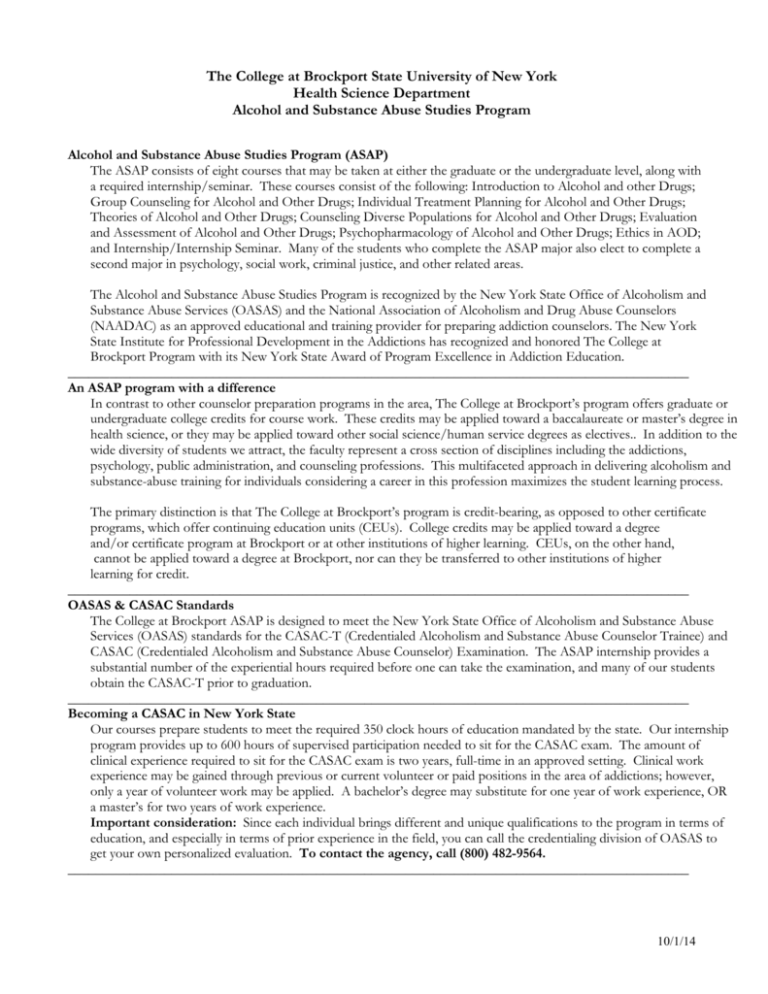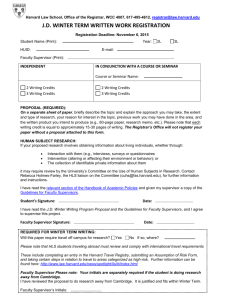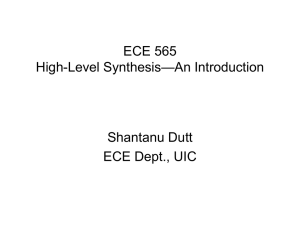here - Brockport
advertisement

The College at Brockport State University of New York Health Science Department Alcohol and Substance Abuse Studies Program Alcohol and Substance Abuse Studies Program (ASAP) The ASAP consists of eight courses that may be taken at either the graduate or the undergraduate level, along with a required internship/seminar. These courses consist of the following: Introduction to Alcohol and other Drugs; Group Counseling for Alcohol and Other Drugs; Individual Treatment Planning for Alcohol and Other Drugs; Theories of Alcohol and Other Drugs; Counseling Diverse Populations for Alcohol and Other Drugs; Evaluation and Assessment of Alcohol and Other Drugs; Psychopharmacology of Alcohol and Other Drugs; Ethics in AOD; and Internship/Internship Seminar. Many of the students who complete the ASAP major also elect to complete a second major in psychology, social work, criminal justice, and other related areas. The Alcohol and Substance Abuse Studies Program is recognized by the New York State Office of Alcoholism and Substance Abuse Services (OASAS) and the National Association of Alcoholism and Drug Abuse Counselors (NAADAC) as an approved educational and training provider for preparing addiction counselors. The New York State Institute for Professional Development in the Addictions has recognized and honored The College at Brockport Program with its New York State Award of Program Excellence in Addiction Education. __________________________________________________________________________________________ An ASAP program with a difference In contrast to other counselor preparation programs in the area, The College at Brockport’s program offers graduate or undergraduate college credits for course work. These credits may be applied toward a baccalaureate or master’s degree in health science, or they may be applied toward other social science/human service degrees as electives.. In addition to the wide diversity of students we attract, the faculty represent a cross section of disciplines including the addictions, psychology, public administration, and counseling professions. This multifaceted approach in delivering alcoholism and substance-abuse training for individuals considering a career in this profession maximizes the student learning process. The primary distinction is that The College at Brockport’s program is credit-bearing, as opposed to other certificate programs, which offer continuing education units (CEUs). College credits may be applied toward a degree and/or certificate program at Brockport or at other institutions of higher learning. CEUs, on the other hand, cannot be applied toward a degree at Brockport, nor can they be transferred to other institutions of higher learning for credit. __________________________________________________________________________________________ OASAS & CASAC Standards The College at Brockport ASAP is designed to meet the New York State Office of Alcoholism and Substance Abuse Services (OASAS) standards for the CASAC-T (Credentialed Alcoholism and Substance Abuse Counselor Trainee) and CASAC (Credentialed Alcoholism and Substance Abuse Counselor) Examination. The ASAP internship provides a substantial number of the experiential hours required before one can take the examination, and many of our students obtain the CASAC-T prior to graduation. __________________________________________________________________________________________ Becoming a CASAC in New York State Our courses prepare students to meet the required 350 clock hours of education mandated by the state. Our internship program provides up to 600 hours of supervised participation needed to sit for the CASAC exam. The amount of clinical experience required to sit for the CASAC exam is two years, full-time in an approved setting. Clinical work experience may be gained through previous or current volunteer or paid positions in the area of addictions; however, only a year of volunteer work may be applied. A bachelor’s degree may substitute for one year of work experience, OR a master’s for two years of work experience. Important consideration: Since each individual brings different and unique qualifications to the program in terms of education, and especially in terms of prior experience in the field, you can call the credentialing division of OASAS to get your own personalized evaluation. To contact the agency, call (800) 482-9564. __________________________________________________________________________________________ 10/1/14 About our Internships A supervised internship placement is necessary for successful degree completion. The length of the internship varies, depending upon your prior work experience in the field. Internship credits are determined in consultation with the program coordinator. The internship placement occurs after you have completed the initial eight core courses (as well as HLS 488) with a grade of C or better and have an overall GPA of at least 2.50. Internship placements include inpatient, outpatient, adolescent, corrections, and rural treatment programs. Many internships are set up as a volunteer experience for which you receive course credit. If an agency offers you a paid position as part of your internship, it is possible that you will be able to accept it. However, in such situations, please be sure to consult the program coordinator. __________________________________________________________________________________________ Taking ASAP courses to supplement your education The area of alcohol and substance abuse affects all walks of life, hence, the content of the ASAP courses will be of value to most students interested in the human condition. Alcohol and substance abuse issues have a direct influence on individuals and families as well as systems (mental health, criminal justice, corrections, etc.). As in any discipline, it would be to your advantage to learn as much as possible about this area of study; however, we have no indication that students who are not in the addictions field have any more difficulty with the course work than do those who are not in the addictions field, if they have fulfilled appropriate prerequisites. __________________________________________________________________________________________ Combining ASAP coursework with a master’s program Upon consultation with your advisor, you may incorporate several of the ASAP courses into your graduate degree. Many students in the health science, public administration, counselor education, and social work programs choose this option. __________________________________________________________________________________________ If you have already completed the undergraduate program At the present time, we are referring students to graduate-level course work in counselor education, social work, nursing, and public administration. Additional options for graduate study may be discussed with your faculty advisor. __________________________________________________________________________________________ Grade and GPA requirements Program requirements provide no credit for a course in which the student receives a grade of lower than “C.” For example, if you get a “C -” in a course, you would have to take the course over in order to get credit for the class leading to the certification. While this is consistent with the policy for health science majors, it may not be consistent with the policies for other majors. For example, a “C -” may be accepted for credit toward your social work degree, but the “C-“would not be accepted toward completion of the certificate program. For requirements for majors other than health science, consult with your advisor. An overall 2.50 GPA is required to enroll in the internship/seminar. __________________________________________________________________________________________ Job opportunities and salary expectations Many of our students, upon completion of the internship experience, secure positions in the alcoholism/substance abuse counseling area. In addition, several of our students decide to further their education at the graduate level. Whether it be a job, further training, or graduate study, our program offers students many different opportunities. Salaries for entry-level counselors vary depending upon the agency, organization, or treatment center (federal, state, or local). Most individuals with a bachelor’s degree enter the profession earning in the low- to mid-twenties. Those individuals earning the CASAC or holding a master’s degree are able to command higher salaries. __________________________________________________________________________________________ 10/1/14 About the faculty At the present time, our faculty consists of professional counselors and educators trained in the areas of addictions counseling, public administration, rehabilitation counseling and psychology. The faculty is as follows: Program Coordinator: Gary J. Metz, MS, MPA, CASAC, MAC Metz is the program coordinator and an associate professor of health science. He holds master’s degrees in health science and public administration from The College at Brockport and is a master addictions counselor. Metz has over forty years of experience in the profession as an administrator, counselor and educator. He has served as a consultant and director on numerous grants that provide substance abuse prevention, intervention and treatment programming to South America, Near and South East Asia and Russia. His research interests focus on rural substance abuse prevention, substance abuse and criminal justice populations and cults, sects and fringe group movements. Metz is the recipient of numerous awards including the International Narcotics Enforcement Officers Association Award of Honor, The Phi Beta Delta Metal for International Drug Prevention Programming and the SUNY Chancellor’s Award for Excellence in Faculty Service. Program faculty member: Jessica L. Sniatecki, PhD, CRC Sniatecki is an assistant professor of health science in ASAP. She holds her doctorate in counselor education from the University at Buffalo and has held national certification as a Rehabilitation Counselor since 2004. Sniatecki has clinical experience with individuals and groups in a variety of treatment settings. Her research focuses on the college experience for students with disabilities, positive aspects of disability, and career development for students with disabilities. __________________________________________________________________________________________ Required courses The following is a compilation of the required ASAP courses. Because each course is not offered every semester, be sure to check course schedules and discuss your program outline with an ASAP faculty member. All courses need to be completed prior to the internship seminar and internship. In addition to the required ASAP courses, students are also required to take HLS 488: Applied Biostatistics and Epidemiology. HLS 409/509 Introduction to Alcohol and Other Drugs. Introduces students to a variety of drug problems, including alcohol and tobacco, in contemporary society. Analyzes the diverse determinants (e.g., pharmacologic, behavioral, social, economic, historic) of these problems. Discusses effective substance abuse prevention and treatment strategies. 3 credits. HLS 421/521 Group Counseling for Alcohol and Other Drugs. Corequisite or prerequisite: HLS 418/518 or HLS 409/509 (may be taken concurrently). Introduces students to the basic foundations of group dynamics and group therapy. Deals with the historical development of the group process movement, stages and techniques of group therapy, curative aspects of the group process, interpersonal learning, and problems associated with group process. 3 credits. HLS 422/522 Individual Treatment Planning for Alcohol and Other Drugs. Corequisite or Prerequisite: either HLS 418/518 or HLS 409/509 (may be taken concurrently). Introduces students to the elements of individualized treatment planning; provides in-depth coverage of client goal formulation; and requires writing and evaluation of attainable client objectives. Also examines the bio-psychosocial-spiritual aspects of the individualized treatment plan and client case management. 3 credits. HLS 423/523 Theories of Alcohol and Other Drugs. Corequisite or prerequisite: HLS 418/518 or HLS 409/509 (may be taken concurrently). Reviews major contemporary theories on alcoholism and other addictions (disease model, psychoanalytic formulations, conditioning models, social learning analyses, family systems perspectives, socio-cultural view points, transtheoretical model (stages of change) and harm reduction. Critically evaluates the concepts and research generated from each perspective. Analyzes the usefulness of each theory in the practice of substance abuse prevention and counseling. 3 credits. HLS 424/524 Counseling Diverse Populations for Alcohol and Other Drugs. Corequisite or prerequisite: either HLS 418/518 or HLS 409/509 (may be taken concurrently). Prepares students for working in a counseling setting with alcohol/substance abusers having multiple emotional and developmental disabilities, criminal justice clients, and 10/1/14 individuals from diverse population groups including Native Americans, Latinos, people of color, women, and gays/lesbians. 3 credits. HLS 435/535 Evaluation and Assessment of Alcohol and Other Drugs. Prerequisite: HLS 418/518 or 409/509 . Covers the theory and methodology of measurement, assessment and evaluation in alcohol and substance abuse and alcoholism and dependence. Studies the more widely researched and utilized methods of assessment: clinical interviews, structured interviews, and standardized instruments. Reviews instruments used in screening, diagnosis, treatment planning and neuropsychological evaluation. Also covers documentation, report writing and the ethics of assessment. Employs extensive use of clinical materials to illustrate uses and limitations of various techniques. 3 credits. HLS 445/545 Psychopharmacology of Alcohol and Other Drugs. Cross-listed as PSH 445. Corequisite or Prerequisite: HLS 418/518 or HLS 409/509 (may be taken concurrently). Covers the effects of alcohol, sedatives, stimulants, opiates, hallucinogens and other drugs, especially their effects on the central nervous system, behavior and mood. Relates the pharmacokinetics and pharmacodynamics to intoxication tolerance, withdrawal, abuse and dependence of each drug. Includes the learning and motivational components of drug tolerance and addiction. 3 credits. HLS 455/555 Ethics in Alcohol and Other Drugs. Corequisite or prerequisite: HLS 418/518 or HLS 409/509 (may be taken concurrently). Helps students develop a personal framework for ethical action and become more effective in addressing ethical issues in the field of alcohol and drug dependency counseling. Uses the ethical standards of OASAS and NAADAC to build a theoretical framework for approaching ethical dilemmas in a systematic way. Intended to deepen awareness of new and emerging ethical issues and provide the tools necessary for the entry level professional. 3 credits. *HLS 497/597 Intern Seminar for Alcohol and Other Drugs Prerequisites: HLS 418/518, 421/521, 422/522, 423/523, 424/524, 435/535, 445/545, HLS 455/555; 488; 2.5 GPA for all courses completed at The College at Brockport and instructor’s permission. Designed to be taken concurrently with HLP 498. Allows students to process their experience in the field in a clinical group supervision format. Addresses issues which present themselves within the internship setting, including situations with clients, peers, and supervisors. Covers ethics, confidentiality, and diversity issues. Satisfactory/Unsatisfactory Grading. 3 credits. *HLP 498/HLS 598 Internship for Alcohol and Other Drugs. Course fee. Prerequisites: HLS 409/509 or 418/518, 421/521, 422/522, 423/523, 424/524, 435/535, 445/545, 455/555; 488; 2.5 GPA; and program coordinator’s permission. Provides an internship in an alcoholism and substance abuse treatment facility. Requires students to apply knowledge from course work in a variety of settings with people in varying stages of alcohol and substance abuse and dependence; and to gain experience in assessment, treatment planning, evaluation, making referrals, counseling, therapeutic treatment, and professional ethics. Satisfactory/Unsatisfactory Grading. 12 credits. *HLS 497/597 and HLP 498/ HLS 598 must be taken concurrently, during fall or spring semester. 10/1/14








